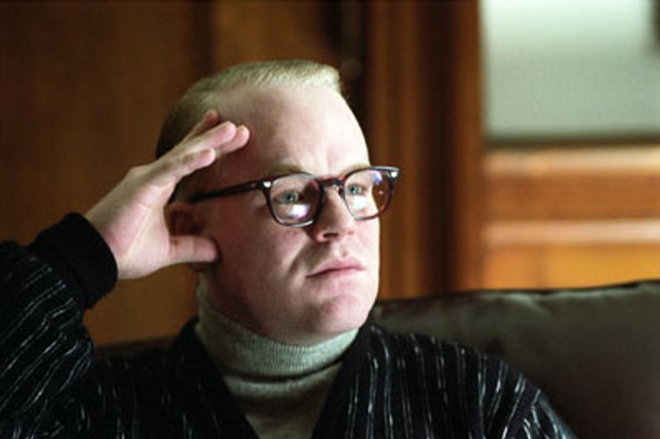
TORONTO — Unless you knew that the guy strolling into the room was Philip Seymour Hoffman, the celebrated actor, you might not give him a second glance. Hoffman could be almost anybody behind that strawberry-blond peach fuzz, just another slightly overweight guy with regular features, a shy smile and a checked shirt that might have been picked off the rack at Sears. There's no attitude, no carefully cultivated patina of celebrity... nothing.
Then again, maybe that's just who we should expect Hoffman to be in real life. After all, this is an actor whose on-screen work often seems like the antithesis of Hollywood's cult of personality. People remember Hoffman's astonishing, chameleon-like transformations in films like Boogie Nights and Magnolia even if they don't remember his name, adding to a public perception of the actor as a blank slate, a piece of human clay waiting for the next role to give him shape.
That might all be about to change with Hoffman's latest role, a career-topping performance in Capote, as author Truman Capote struggling to complete his groundbreaking book In Cold Blood. It's the sort of meticulously crafted, note-perfect performance that people can't keep from talking about, and one that appears to give Hoffman a virtual lock on a Best Actor nomination at next season's Oscars.
In person, Hoffman comes off as affable, unaffected and so refreshingly ordinary that you almost wonder if it's just another sort of act. He ambles into the Four Seasons Hotel for a roundtable interview for Capote, and immediately begins talking about what compelled him to take on the role that may soon make him exponentially more famous.
"What I was drawn to was this classic tragedy of something playing itself out," explains Hoffman, referring to how Capote's artistic success fed his self-destruction, "and no one can stop it. I think that's what makes this film so compelling. You realize that you're on this train toward this place, and it's inevitable.
"We knew the story wasn't going to shine him in the best of lights," he continues. "I mean, the guy died at 59, alone, of alcoholism, without ever writing another book. That's the story, that's the life. We were telling a tale of what we thought started that ball rolling."
Hoffman didn't get around to reading In Cold Blood until after he'd already committed to Capote ("I wasn't assigned the book in college like everybody else," he laughs), but he more than made up for lost time by obsessively researching his part. The actor locked himself away in a room for months on end, pouring over archival footage of Capote in an effort to figure out how to nail his subject (one of the 20th century's most often and easily spoofed figures) in a way that was truthful without resorting to slavish impersonation.
"That's always a world that is a bit gray," says Hoffman. "It's indefinable, but ultimately it couldn't be just mimicry. I was creating a character, a real guy."
In the end, Hoffman's Capote is utterly convincing. He is so fully believable, in fact, that one has to wonder if the actor had trouble letting go of the character when the cameras weren't rolling. "Well, I didn't go to shops and stuff like that [as Capote]. I think that would have been really frightening," he says with a laugh.
"I did stay in character on the set, though. It's like an athletic event, meaning that if you're running a race you don't want to stop in the middle of the race and have to start running again. I had to keep a certain sense of the voice and the physicality because if I let it go it's too much energy to get it back up again. But once the day was over I'd go home and be me again."
Following the artistic tour-de-force of Capote, Hoffman's next role will be something both lighter and heavier — as the resident bad guy in Mission Impossible 3. Hoffman claims he has no master plan for his career, but you've got to wonder just how this guy picks his parts.
"There's a certain aspect of play-it-as-it-comes," he says, laughing again. "You don't want to plan too much because you don't know what's coming."
And speaking of possible futures, with Capote on everyone's lips and the Academy Awards fast approaching, what would an Oscar mean to Philip Seymour Hoffman?
"A lot," he says, beaming from ear to ear; you can tell that the actor isn't acting at all.

